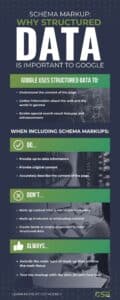Schema markup, often called structured data, is backend web code used to help search engines and machine learning algorithms quickly get a deep understanding of the content on a webpage. SEO (search engine optimized) schema markup contributes to improved visibility, click-through rates, and overall search rankings by activating the possibility for rich snippets to be included in the SERPs.
It is important to note that while schema markup is a type of structured data, not all structured data is schema markup. To clarify, “schema markup” is a way of structuring data to quickly communicate information to search engines. “Structured data” refers to the organization and formatting of data so that it can be understood by machines. In this article, we may use these terms interchangeably.
Let’s discuss why Google loves schema markups, why they are important for increased organic visibility, and do’s & don’ts to ensure SEO best practices are followed.
Why Search Engines Love Structured Data
Structuring the data on a website saves crawl time by giving Google and other crawlers what they need in a quick and simple format. This allows crawlers and other machine learning algorithms to understand content without having to read the full code of a webpage. As a result, an efficiency is created that saves search engines’ time and resources.
Why SEO’s Love Structured Data
Adding structured data enables rich results. These are experiences on Google Search that go beyond the standard blue link to a webpage. They are the search results that are more engaging to users, encouraging them to interact more with your website. Rich results can include maps, knowledge graphs, carousels, images, and other non-textual elements.
Enhanced search results have been shown to lead to increased organic visibility and clickthroughs. Here are few of Google’s case studies of websites that have implemented structured data for their site:
- “Rotten Tomatoes added structured data to 100,000 unique pages and measured a 25% higher click-through rate for pages enhanced with structured data, compared to pages without structured data.
- The Food Network has converted 80% of their pages to enable search features, and has seen a 35% increase in visits.
- Rakuten has found that users spend 1.5x more time on pages that implemented structured data than on non-structured data pages, and have a 3.6x higher interaction rate on AMP pages with search features vs non-feature AMP pages.
- Nestlé has measured pages that show as rich results in search have an 82% higher click through rate than non-rich result pages.”
Common Structured Data Formats
Google Search supports structured data in the following formats, unless documented otherwise.
- JSON-LD – Most popular and Google preferred
- Microdata – Annotates content with specific machine-readable labels
- RDFa – An extension to HTML5
These formats allow webmasters to provide detailed information about their pages in a way that can be understood by machines. While Google has expressed a preference for JSON-LD format, the webmaster should decide which format to employ based on their site’s requirements. Each format has its own syntax and structure, but all serve the purpose of speeding indexation and enhancing the visibility and comprehensibility of web content to search engines.
Best Practices: SEO Schema Markup Do’s & Don’ts
Best practices must be followed when optimizing your structured data. The most important thing to remember is that structured data is a representation of the actual information that is on a page. Google is using this information to understand the content of the page while it gathers information. The goal is to enable rich snippets, special result features, and enhancements for greater organic visibility.
Make sure the information you provide is original, up to date, and most of all, accurate. Schema markup code should not be used as a place for keyword stuffing or misrepresentation.
Content or data descriptions within the code should not be misleading, and there should be no code without corresponding content on the page to support that code. Only include relevant markups in your code and be as detailed as possible within the structure. Always validate the markup with an appropriate tool like the Schema.org Validator or the Rich Results Test Tool.
Below is an infographic illustrating the do’s and don’ts of SEO schema markup:
Download here: Schema Markup Infographic
Getting Help with Schema Markup
In a nutshell, SEO schema markup applied correctly helps Google offer rich snippets of your content, putting it in front of more people, who are more likely to engage with the snippet. While it is a simple concept, correct implementation can be complex.
Let us help you correctly structure the data on your site to support a boost in your online visibility. We are advanced SEO professionals with deep knowledge, expertise, and over 100 years of combined experience. Talk to an SEO expert about your site.



